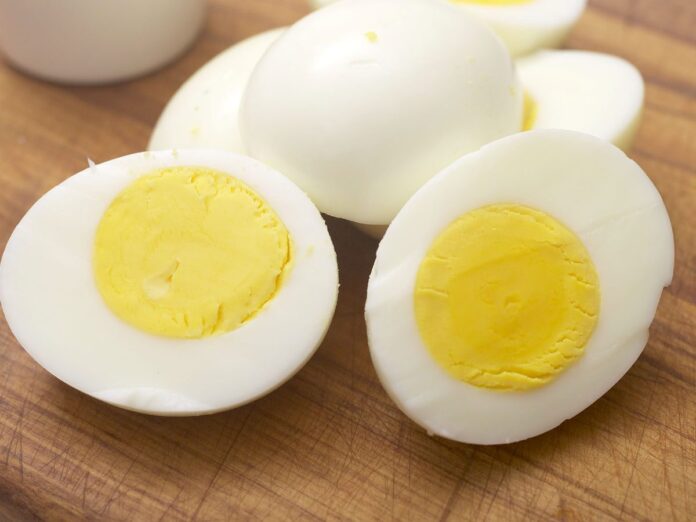HARLINGEN — Cholesterol.
It carries a negative connotation and is often associated with dangerous health conditions such as obesity, heart disease and even strokes.
It’s also common knowledge egg yolks have a relatively high level of cholesterol, but therein lies the misconception, according to a local health expert.
“There’s no such thing as good or bad cholesterol in food. It’s just cholesterol,” said Rachel Villarreal, a registered dietician and clinical assistant professor at the UTRGV College of Health Professions.
“In your body, you make good cholesterol or you make bad cholesterol. You make it from saturated fats. That’s really the culprit.”
Villarreal, who has a master’s degree in science nutrition and is also a certified diabetes educator, said the yolk is actually the healthiest part of the egg.
Packed with healthy fats and calories, essential vitamins and minerals and immune-stimulating compounds called immunoglobulins, the egg yolk has many great benefits, according to Villarreal.
“In the egg white, it just has the protein, but in the yolk, you have quite a lot of good things,” she said. “It has your fat-soluble vitamins, A, D, E and K. It also has your carotenoids, that’s why it’s yellow. It has antioxidants in it.”
PUT IT INTO CONTEXT
The key to enjoying the many health benefits of whole eggs is to put two important factors into context, as Villarreal explained.
The first factor is to understand a person’s health status.
“It’s different for people who have existing conditions like heart disease or diabetes,” she said. “Then, we start looking at the diet and make sure these people are not increasing their risk, at all.”
Age and weight also have to be considered, according to Villarreal.
“It’s all based on weight. A child is going to need less calories than an adult, depending on their age, of course. Teenagers need quite a few more calories. You want to look at the entire diet, and make sure they’re getting what they need,” she said.
“The same for the elderly. The older you get, the less calories you need. You don’t move as much. When you were younger, you had an active metabolism, but when you’re older, yes, you need to cut back on calories.”
The second factor is to look at a person’s overall diet and food choices.
“If you’re the type of person that’s only eating eggs and bacon and starches and during the day you’re eating a big steak, these foods that have a lot of saturated fat, then yes, maybe you need to cut back on eggs and really look at your diet in total,” Villarreal said. “Everything can be included in a balanced diet. If you’re eating one or two eggs every day and are including things like whole wheat toast, using low-fat butter, having a piece of fruit and during the day you’re also eating fruits and vegetables and whole grains, then yes, eggs are fine.”
WITH A SIDE OF HEALTH
As a rule-of-thumb, Villarreal recommends to look at what else a person is eating along with eggs, which is what usually makes the meal less healthy and adds more saturated fat and sugars.
“Did they fry the eggs, or did they boil them? Did they cook it in butter? And what did they have on the side? Did they eat bacon with it? Whole wheat toast?” she said as examples.
Another suggestion is to eat more egg whites, but still keep a whole egg in the mix.
“If you’re eating quite a few eggs, substituting egg whites or mixing a couple of egg whites with one whole egg would be good,” she said. “I would keep at least one whole egg in there so you at least get some of the nutrients of the yolk.”
MASS-PRODUCED vs. ORGANIC EGGS
As for the difference between mass-produced eggs and organic or free-range eggs, Villarreal explained it’s all in the yolk.
“Mass produced eggs, the chickens don’t get a lot of sunlight. They’re not free-range so they don’t get a lot of nutrition themselves. Just like humans, they are what they eat,” she said, adding that she has a few chickens in her backyard. “Chickens that are raised on a farm or are free-range eat bugs, get to be in the sunlight, get plenty of vitamin D. They’re eating grass and all that actually enriches the yolk of the egg and gives it more antioxidants.”
THE REAL DANGERS
So, cholesterol is not the big, bad, unhealthy compound it’s made out to be, after all. The focus should be on other factors that are the real dangers, according to Villarreal.
“The big body of research says people need to decrease their saturated fat, their trans-fat, their added sugars and their sodium intake because those things actually lead to problems like heart disease,” she said. “It’s well researched and verified.”
Did you know?
• Egg yolks are packed with healthy fats and calories, essential vitamins and minerals and antioxidants and other immune-stimulating compounds.
• Health benefits of egg yolks include improving fat and protein metabolism, helping brain development and health, maintaining healthy blood production and strengthening bone density.
• Egg yolks contain an average of 43 percent of the total protein content of an egg.
• Food does not contain bad cholesterol. Your body produces it based on your intake of saturated fat and added sugars.
• Your consumption of whole eggs should follow your dietary restrictions based on weight, age and existing medical conditions.





